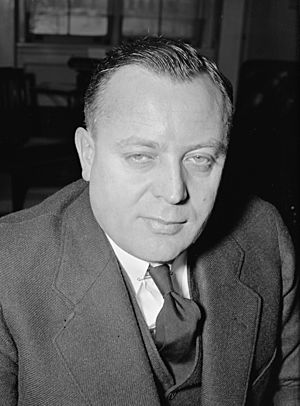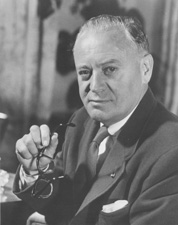Styles Bridges facts for kids
Quick facts for kids
Styles Bridges
|
|
|---|---|

Bridges in 1939
|
|
| Chair of the Senate Republican Policy Committee |
|
| In office January 3, 1955 – November 26, 1961 |
|
| Leader | William F. Knowland Everett Dirksen |
| Preceded by | Homer S. Ferguson |
| Succeeded by | Bourke B. Hickenlooper |
| President pro tempore of the United States Senate | |
| In office January 3, 1953 – January 3, 1955 |
|
| Preceded by | Kenneth McKellar |
| Succeeded by | Walter F. George |
| Leader of the Senate Republican Conference | |
| In office January 3, 1949 – November 29, 1951 |
|
| Deputy | Leverett Saltonstall |
| Preceded by | Kenneth S. Wherry |
| Succeeded by | Robert A. Taft |
| Chair of the Senate Appropriations Committee |
|
| In office January 3, 1953 – January 3, 1955 |
|
| Preceded by | Kenneth McKellar |
| Succeeded by | Carl Hayden |
| In office January 3, 1947 – January 3, 1949 |
|
| Preceded by | Kenneth McKellar |
| Succeeded by | Kenneth McKellar |
| Senate Minority Leader | |
| In office January 8, 1952 – January 3, 1953 |
|
| Deputy | Leverett Saltonstall |
| Preceded by | Kenneth S. Wherry |
| Succeeded by | Lyndon B. Johnson |
| United States Senator from New Hampshire |
|
| In office January 3, 1937 – November 26, 1961 |
|
| Preceded by | Henry W. Keyes |
| Succeeded by | Maurice J. Murphy Jr. |
| 63rd Governor of New Hampshire | |
| In office January 3, 1935 – January 3, 1937 |
|
| Preceded by | John Winant |
| Succeeded by | Francis P. Murphy |
| Personal details | |
| Born |
Henry Styles Bridges
September 9, 1898 Pembroke, Maine, U.S. |
| Died | November 26, 1961 (aged 63) Concord, New Hampshire, U.S. |
| Political party | Republican |
| Spouses |
Sally Clement
(m. 1928; Doloris Thauwald
(m. 1944) |
| Education | University of Maine (BA) |
Henry Styles Bridges (September 9, 1898 – November 26, 1961) was an American politician. He was a teacher and editor before entering politics. Styles Bridges was a member of the Republican Party from Concord, New Hampshire. He served one term as the 63rd governor of New Hampshire. After that, he had a long career in the United States Senate for twenty-four years.
Contents
Early Life and Career Path
Bridges was born in West Pembroke, Maine. His parents were Alina Roxanna (Fisher) and Earle Leopold Bridges. He went to the public schools in Maine. Styles Bridges attended the University of Maine at Orono until 1918.
From 1918, he worked in many different jobs. He taught at Sanderson Academy in Ashfield, Massachusetts, from 1918 to 1919. He was also part of the extension staff at the University of New Hampshire from 1921 to 1922.
Bridges worked as the secretary of the New Hampshire Farm Bureau Federation from 1922 to 1923. He was also the editor of the Granite Monthly Magazine from 1924 to 1926. In addition, he was a director and secretary for the New Hampshire Investment Corporation from 1924 to 1929. Later, he served on the New Hampshire Public Service Commission from 1930 to 1934.
Political Journey and Achievements
Styles Bridges ran for governor of New Hampshire in 1934. He won the election and became the youngest governor in the nation at that time. This fact was noted by John Gunther in his book Inside U.S.A..
In 1936, Bridges was elected to the United States Senate. He served as a senator until he passed away in 1961. In 1937, he left the Army Reserve Corps, where he had been a lieutenant since 1925.
Bridges sought the Republican nomination for President in 1940. However, Wendell Willkie won the nomination. That same year, Bridges also received some votes for the Republican vice presidential nomination.
He was reelected to the Senate four more times: in 1942, 1948, 1954, and 1960. He did not finish his last term because he died. Bridges became a very important Republican senator.
He held several leadership roles in the Senate. He was chairman of the Joint Committee on Foreign Economic Cooperation from 1947 to 1949. He also served as Senate Minority Leader from 1952 to 1953.
Bridges was the President pro tempore of the United States Senate from 1953 to 1955. This role is usually held by the most senior senator of the majority party. He also chaired the Joint Committee on Inaugural Arrangements for both of President Dwight Eisenhower's inaugurations.
He was the Chairman of the Committee on Appropriations from 1947 to 1949 and again from 1953 to 1955. This committee handles how the government spends money. From 1954 until his death, he was the Chairman of the Republican Policy Committee.
In 1946, Bridges was part of a committee that looked into voter issues in Mississippi. He voted in favor of the Civil Rights Act of 1960. After World War II, when the U.S. government was bringing in scientists from Germany, Bridges spoke about the need to improve the State Department's processes.
Support for Joseph McCarthy
Styles Bridges was a strong supporter of Senator Joseph McCarthy from Wisconsin. He was one of only 22 senators who voted against criticizing McCarthy in 1954. McCarthy was known for his investigations into people suspected of being communists.
Later Life and Legacy
Bridges passed away from a heart attack on November 26, 1961, in East Concord. His funeral service was attended by many people. He was buried in Pine Grove Cemetery.
Styles Bridges left his East Concord home to the state of New Hampshire. It now serves as the official residence for New Hampshire's governors. This home is known as "Bridges House."
The "Styles Bridges Room" in the U.S. Capitol was named in his honor on March 12, 1981. Also, a section of Interstate 93 in New Hampshire is named the Styles Bridges Highway. This highway runs from Concord north to the Vermont state line.
See also
 In Spanish: Styles Bridges para niños
In Spanish: Styles Bridges para niños
- List of United States Congress members who died in office (1950–99)
Additional sources
- McDaniel, Rodger.
 | Mary Eliza Mahoney |
 | Susie King Taylor |
 | Ida Gray |
 | Eliza Ann Grier |


